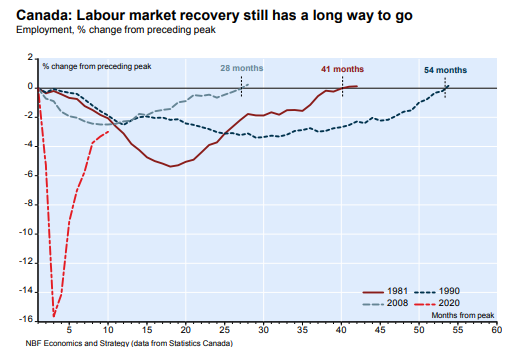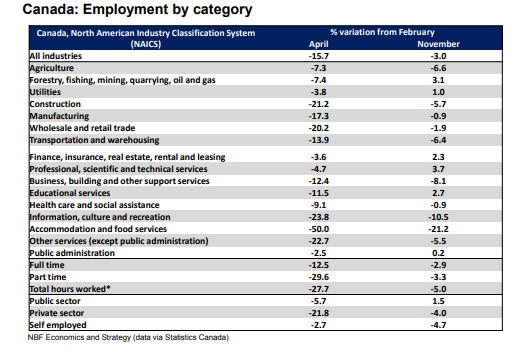The Canadian Economy Has A Long Road Ahead To Recover The Jobs Lost In The Pandemic
The Canadian job market recovery continued to slow in November, adding only 62,000 net new jobs compared with 84,000 which were created in October.
The unemployment rate in November fell to 8.5% from 8.9% in October.
In November 99,000 full-time jobs were created and 37,999 part-time jobs disappeared. Employment in the goods sector in November far outstripped the small employment rebound in the service sector, which continued to shed food service jobs in the last two months.
But as both a chart and table below illustrate, Canada’s jobs recovery since early May still leaves total employment significantly below its previous peak in February. The employment increases in November left Canada 574,999 jobs short of restoring the 3 million jobs which were lost in March and April.
Indeed, the same chart clearly illustrates how different the pandemic recession has been for employment levels compared to the three previous Canadian recessions (1981, 1990, and 2008).
For example, it required a painful 54 months (or more than four years) for Canada to restore previous peak employment levels following the financial crisis associated with the deep 2008 recession.
Clearly, this time around the economic and employment recovery is very different than past situations, since the pandemic recession was not caused by a global financial crisis, and of course, the current recovery is still supported by massive fiscal and monetary measures compared to past recoveries.
With respect to the sectors of the Canadian economy experiencing the greatest job losses, it is not surprising that the hospitality sector (with restaurants and bars at the forefront) are suffering the most. The information and cultural industries follow with the next greatest job losses due to the pandemic recession.
At the same time, currently employment in all sectors is performing far better than the huge job cuts which occurred in March and April.
That is, as of November total employment was down 3% from its previous peak in March compared to a 15% employment drop between February and April.
The employment and income losses in the accommodation and food sector has been enormous. In April (at its worst) employment in accommodation and food was down 50% from the earlier February peak.
Looking into the near term, the outlook for employment in the retail and hospitality sectors is still far from encouraging.
Nonetheless, Canada’s total economic response to the pandemic recession is much more V like than the extended U shape I thought was possible.
(Click on image to enlarge)

(Click on image to enlarge)

(Click on image to enlarge)




